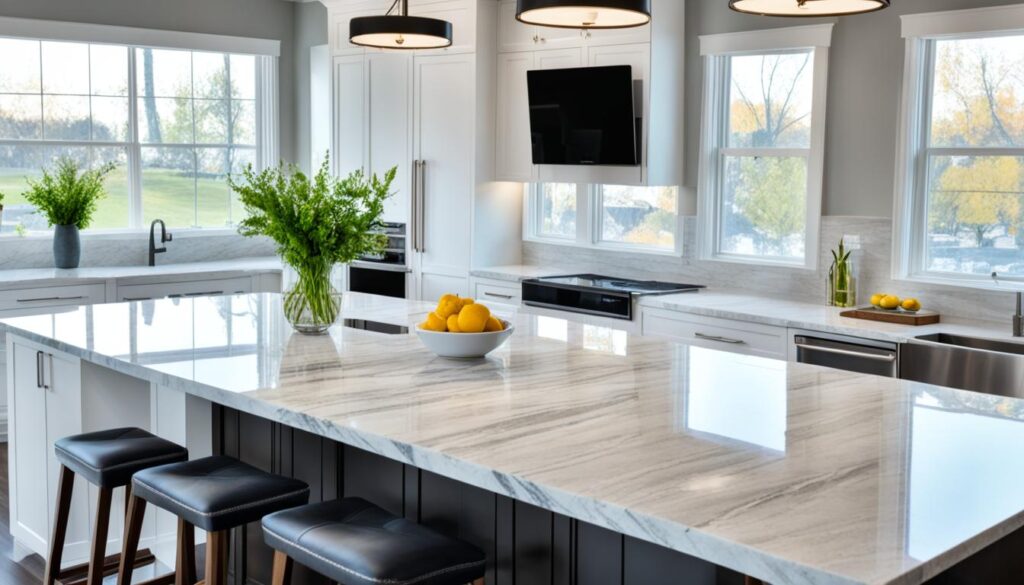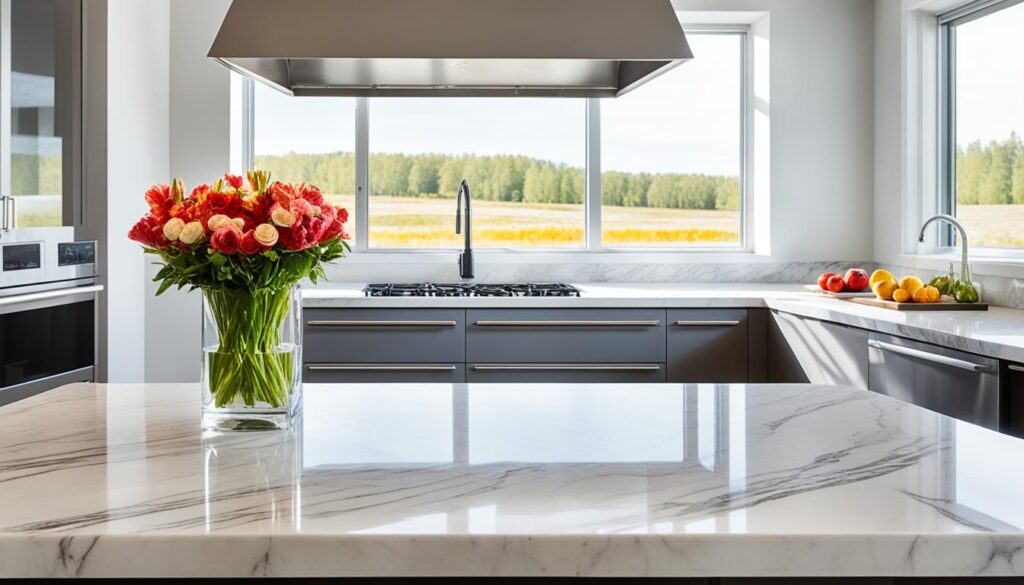Table of Contents
Are you pondering, “Can quartzite countertops stain or scratch?” You’re definitely not alone in this. Many homeowners and business owners who aim for that flawless look have tossed this question our way.
Truth be told, despite its beauty and durability, quartzite isn’t bulletproof. Without the right care, it’s prone to both staining and scratching.
We understand the struggle all too well. The quest for the perfect kitchen and workspace materials led us on a deep dive into the realm of quartzite countertops. What we found is pretty encouraging: Quartzite naturally holds up better against stains and scratches than many other surfaces out there.
However, it’s far from indestructible.
This realization pushed us to gather wisdom from experts and mine insights from real-life experiences to craft a maintenance guide brimming with tips that’ll help keep your countertops gleaming like new for years ahead.
Ready to safeguard your beautiful space? Let’s dive in!
Key Takeaways
- Quartzite countertops come from natural stone and need sealing to protect against stains and scratches. They are strong but can get damaged without proper care.
- We should use coasters, cutting boards, and clean spills quickly to keep quartzite looking good. Sealing the countertop every 6 to 12 months is also important.
- For tough stains on quartzite, options include mild detergent, baking soda paste, hydrogen peroxide, or professional help if needed, just reach out to Rock Solid Tops .
Understanding Quartzite Countertops
Quartzite countertops are strong and beautiful. They come from natural stone and have unique patterns that make each piece special.
Composition and Properties
Quartzite countertops come from natural stone. They form under high heat and pressure over millions of years. This process makes quartzite very strong. It is a dense material, which helps it resist stains and scratches better than many other surfaces.
The main components of quartzite are sand and silica. These give the stone its hardness and unique colors. Quartzite differs from both granite and quartz in how it forms. Granite is an igneous rock made from cooled magma, while quartz is a man-made surface that mixes resin with natural stone particles.
Each type has its own strengths, but we love how durable quartzite can be for our homes or businesses.
Comparison to Quartz and Granite
We help homeowners and business owners understand how quartzite countertops stand up against quartz and granite. These materials are popular for their beauty and durability. Yet, each has unique features and care requirements. Here’s a quick comparison to guide your choice:
| Feature | Quartzite | Quartz | Granite |
|---|---|---|---|
| Composition | Natural stone, mainly silica | Engineered stone, 90-94% quartz crystals | Natural stone, mixture of quartz, mica, feldspar |
| Hardness | Very hard and durable | Hard, but less natural | Hard, but can vary |
| Maintenance | Needs sealing | Low maintenance | Requires sealing |
| Stain Resistance | High with sealing | Very high | High with sealing |
| Scratch Resistance | High | Very high | High |
| Heat Resistance | Very high | Low to moderate | High |
| Price | $$-$$$ | $-$$ | $$-$$$ |
Our choices in countertops impact our spaces significantly. Quartzite offers natural elegance with remarkable durability. Its need for sealing is balanced by its resistance to heat and scratches. In contrast, quartz provides a less natural but low-maintenance option, though it’s less heat resistant. Granite, sharing the need for sealing with quartzite, brings its unique patterns but with variable hardness. We guide our choices on facts, ensuring our spaces meet our expectations in both style and function.

Potential Issues with Quartzite Countertops
Quartzite countertops can face some challenges. They may stain or scratch if we do not take care of them properly.
Staining and Scratching
Stains and scratches can happen to quartzite countertops. These surfaces are durable but not completely resistant to damage. They can absorb liquids, especially if left unsealed or stained by food and drinks.
Regular sealing helps keep stains at bay.
Scratches may also occur with heavy use. Quartzite is harder than many stones, yet using sharp objects directly on the surface can cause marks. We should always use cutting boards for food prep to protect our investment in beautiful countertops.
Taking these steps will help maintain the appearance of our natural stone surfaces over time.
Etching and Sealing
Etching happens when acidic substances touch quartzite. Citrus juices and vinegar can cause dull spots on the surface. These stains can be hard to remove. To avoid etching, we should clean up spills quickly.
Using coasters for drinks helps protect our countertops from potential damage.
Sealing quartzite is important for its care and maintenance. A proper seal keeps it safe from stains and scratches. We recommend sealing our countertops regularly to maintain their beauty.
Doing this protects our investment in natural stone countertops and keeps them looking new for longer.
Proper Maintenance and Care
Proper maintenance and care are key for quartzite countertops. We should clean spills right away to prevent stains. Using coasters and cutting boards will help protect the surface from scratches.
Regular sealing of quartzite is essential too. It prevents etching and keeps the stone looking great.
We can remove most stains with simple techniques at home. For tough stains, professional services might be needed. Taking these steps protects our investment in natural stone countertops.
With proper care, we can enjoy their beauty for years to come.
Tips for Preventing Stains and Scratches
To keep our quartzite countertops looking great, we should use coasters and cutting boards. We must also clean up spills right away to avoid stains.
Using Coasters and Cutting Boards
We can protect our quartzite countertops by using coasters and cutting boards. Coasters help keep moisture from drinks off the surface. This is important since quartzite can absorb spills and stains if left too long.
Cutting boards are vital for food prep. Using one prevents scratches on our countertops. Quartzite is strong, but it can still get marks from knives or heavy objects. By making these small changes, we maintain the beauty of our stone countertop care.
Wiping Up Spills Immediately
Wiping up spills right away is key to maintaining quartzite countertops. Any liquid can soak into the stone if left too long. This can lead to stains that are hard to remove. We should always keep a cloth handy for quick clean-ups.
Surfaces like quartzite, while strong, are still somewhat porous. This means they can absorb liquids and stains from juice or oil easily. Taking action quickly protects our investment in these beautiful natural stone countertops.
Let’s make it a habit to clean spills immediately!
Regularly Sealing the Countertop
Regularly sealing the countertop helps protect its surface. Quartzite is a porous stone. This means it can absorb spills and stains without proper care. We should seal our quartzite countertops every six to twelve months.
A good sealant creates a barrier against liquids and dirt.
Sealing also boosts stain resistance and scratch resistance. It keeps our counters looking new for years. We can apply the sealant ourselves or hire professionals for better results.
Taking this step shows we value our investment in natural stone countertops.
Removing Stains and Protecting Your Investment
We can remove stains from quartzite and keep it looking great. Regular cleaning helps protect our investment. We should also consider professional help for tough stains. Discover more tips to safeguard your countertops!
Stain Removal Techniques
Stains on quartzite countertops can be tough. We want to keep them looking great. Here are some stain removal techniques we can use:
- Use a Mild Detergent: Mix warm water with mild dish soap. This solution helps remove light stains. Soak a cloth in it and wipe the stained area.
- Try Baking Soda Paste: Mix baking soda with water to create a thick paste. Spread this paste over the stain and cover it with plastic wrap. Let it sit for about 24 hours, then rinse off.
- Apply Hydrogen Peroxide for Tough Stains: For darker stains, we can use hydrogen peroxide. Apply it to the stain with a soft cloth or sponge. Let it sit for a few hours before rinsing well.
- Use Specialized Stone Cleaners: There are many stone cleaners available that work well on quartzite countertops. Follow the instructions on the label for best results.
- Avoid Harsh Chemicals: Never use bleach or acidic cleaners like vinegar or lemon juice on quartzite surfaces. They can damage the natural stone and lead to etching.
- Seek Professional Help for Stubborn Stains: If stains persist after trying these methods, call in professionals like Rock Solid Tops who specialize in maintaining natural stone countertops.
These methods will help us keep our quartzite countertops looking great for years to come!
Professional Maintenance and Repair Services
We can keep our quartzite countertops looking great with professional maintenance and repair services. Many experts offer help in sealing quartzite, which protects it from stains and scratches.
Regular sealing is key for maintaining the appearance of natural stone countertops.
Removing tough stains may need more than just regular cleaning. Professionals use special techniques to tackle any damage on our counters. This service helps us protect our investment and keeps our kitchen shining bright.
Conclusion
Quartzite countertops can stain and scratch, but we can protect them. We learned that using coasters and cutting boards is key. Wiping spills right away helps too. Regular sealing keeps these surfaces looking great.
These simple steps save us from bigger problems later. Let’s take care of our quartzite to enjoy its beauty for years!

FAQs
Can Quartzite Countertops Stain or Scratch?
Yes, quartzite countertops can stain and scratch if not properly cared for. They are natural stone countertops and require regular maintenance to keep them looking new.
How can I prevent staining on my natural stone countertop?
To prevent stains, it’s best to seal your natural stone countertops regularly. This creates a barrier that protects the surface from spills and other potential sources of stains.
What is the difference between granite, quartzite, and quartz countertops in terms of durability?
Granite and quartzite are both types of natural stone with similar properties. However, they may vary in their resistance to scratches or stains. Quartz is a man-made material known for its high durability but lacks the unique patterns found in natural stones.
Are there any common issues with maintaining these types of countertops?
Common issues include etching prevention which requires careful cleaning practices to avoid damaging the surface finish; also removing stubborn stains might need professional help depending on severity.
What steps should I take for choosing the right countertop material during kitchen renovations?
Consider factors like budget, desired look, usage habits when selecting materials whether it be stain-resistant options like sealed quartzite or scratch-resistant ones such as quartz.

